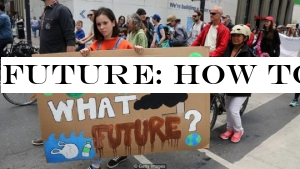
What will our descendants make of how we acted in 2019? The world faces multi-generational challenges like climate change, poverty or antibiotic overuse.
But for much of the time, our eyes remain locked on the present.
Each news cycle brings a moment or event that consumes all of our attention, even if its effects are ultimately transient.We live in an age of pathological short-termismAt the Hay Festival this year, BBC Future brought together three thinkers from the worlds of philosophy, politics and science to discuss what it might take to lengthen our perspective & and reconsider the well-being of future generations.&We live in an age of pathological short-termism,& said philosopher Roman Krznaric, who is writing a book about long-term thinking.
&Politicians cannot see beyond the next week, and nations bicker around conference tables, focusing on near-term interest while the planet burns.&We treat the future like a distant colonial outpost devoid of people where we dump our ecological degradation, risk, nuclear waste and public debt.&Should tomorrow's generations have more rights? (Credit: Getty Images)In many ways, Krznaric continued, we are trampling on the rights of young people & now and tomorrow & to live a healthy and happy life.&I used to be a political scientist and it never once occurred to me that we disenfranchise future generations in the same way we disenfranchised slaves and women in the past.
We give them no political power, no political voice,& he said.Arguably, part of the solution to short-termism lies with our leaders: asking politicians to act with horizons far beyond the next election.
Sophie Howe, the future generations commissioner for Wales, spoke about how her role involves embedding longer-term thinking into government.
It all began with a piece of political legislation in 2015 called the Well-being of Future Generations (Wales) Act.&It applies to all of our public services.
Health boards, local authorities, national bodies, and really significantly the Welsh government themselves have to demonstrate how they are taking decisions which meet today's needs without compromising the ability of future generations to meet their needs,& Howe said.
(Read more about reinventing democracy and politics for the long-term).DEEP CIVILISATIONThis article is part of a BBC Future series about the long view of humanity, which aims to stand back from the daily news cycle and widen the lens of our current place in time.
Modern society is suffering from &temporal exhaustion&, the sociologist Elise Boulding once said.
&If one is mentally out of breath all the time from dealing with the present, there is no energy left for imagining the future,& she wrote.That why the Deep Civilisation season is exploring what really matters in the broader arc of human history and what it means for us and our descendants.Beyond politics, are there better ways of thinking about the future? Lord Martin Rees, author of the book On The Future and co-founder of the Centre for the Study of Existential Risk, spoke about the notion of &cathedral thinking& & the idea that we need a multi-generational approach to the grand challenges we face.Centuries ago, people started to build cathedrals knowing that they wouldn&t be finished in their own lifetimes, he explained.The puzzling thing, Rees said, is that these cathedral builders probably had much shorter horizons into the future than we do.
Today, we have the mental capabilities to imagine the Big Bang all the way through to the end of the Solar System.
&It seems paradoxical that we would have these much broader horizons in time and space but are more short-term, but there is a reason,& he explained.Medieval cathedral-builders expected their descendants to have essentially the same life as them, with the same needs and desires.
Not so for us.&We have no idea what the lives will be like for our children and grandchildren,& Rees said.
It is the dizzying pace of change in modern society that makes it so hard to think longer-term & but that doesn&t mean we should not try.

 8
8






